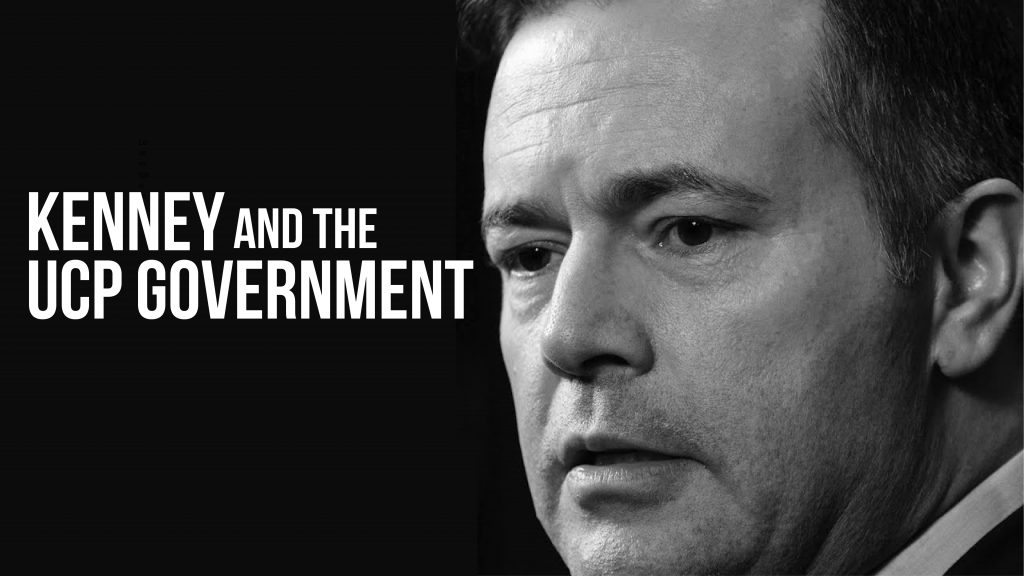Jason Kenney and the UCP as we approach one year

Jason Kenney and the UCP government have seen a decline in support, even from individuals who voted for them in the last provincial election. Photo courtesy of National Post. Graphic by Nathan Woolridge
By Nathan Woolridge, News Editor
Alberta Premier Jason Kenney and his cabinet of ministers took their oaths for office on April 30, 2019 after winning a majority government with nearly 55 per cent of the popular vote. But, as we approach nearly 300 days, on Feb. 24, of the United Conservative Party (UCP) government, are voters still enthusiastic with their new government and what has that government been up to over the past several months?
In mid-December, ThinkHQ Public Affairs released the Alberta government’s approval rating from a survey it conducted — 53 per cent of respondents said they disapproved of the government’s performance, while 44 per cent approved. That was a 12 per cent slide in points from mid-October. And the poll also found 21 per cent of respondents, who voted for the UCP, now disapproved of the party and its actions.
So, what has the UCP government done in recent months to either increase or decrease overall support?
Putting a price on carbon
One of Kenney’s first legislative actions and one of his strongest campaign promises was to scrap the New Democratic Party (NDP) and former premier, Rachel Notley’s carbon tax.
But, when Kenney announced his government’s climate plan, he unveiled his own version of a carbon tax. For the Globe and Mail, Jason Franson wrote: “Because even as Mr. Kenney quietly imposes his carbon tax on industry, he can keep up his very public opposition to any such tax on consumers – secure in the knowledge that Ottawa will act to fill the gap.”
Franson sums it up by adding: “Yes, Alberta’s overall plan is weaker and narrower than what smart climate policy should look like: It covers major emitters such as power plants and the oil industry, but it exempts consumers. Nevertheless, it represents a step forward for Mr. Kenney’s government.
“It’s not a complete plan. But it’s far from a complete sham.”
Cutting public spending
In their 2019 Budget, the UCP were criticized for their actions to cut public spending in several areas.
The budget cut around 2,100 public service positions by 2020 — a 7.7 per cent reduction, according to CBC.
Some of the decisions made in the budget resulted in a loss of jobs. Although, the government maintained funding for kindergarten to grade 12 education as the previous year, it made cuts to Class Size Funding, Classroom Improvement and School Fee Reduction. The Calgary Board of Education announced it would cut 300 temporary teachers following the budget.
As well, the Calgary Catholic School District will face $11-million in funding cuts and will also be faced with $6-million in additional costs related to growth, CBC reports.
The budget also included a 5 per cent decrease in funding for post-secondary education. This led to the University of Calgary to cut 250 jobs.
In November, MRU announced cuts to 10 positions along with the merging of two departments.
President and Vice-Chancellor, Tim Rahilly ensured, “There will be no other layoffs planned in the [2019] calendar year, but unfortunately I must tell you we have more budget work to do, which will inevitably result in the elimination of more positions in 2020.”
Jobs, jobs and no jobs?
In late November 2019 labour organizations in Alberta said there could be a loss of an estimated 6,400 to 7,400 unionized public-sector jobs by 2023, the Edmonton Journal reports. Largely this is related to the UCP’s intentions to contract out various services and enlist changes.
In particular, 3,900 and 4,900 of the expected job losses come from positions in healthcare.
Kenney signed a public health care guarantee, which stated his government would maintain a universally accessible publicly funded health-care system along with maintaining or increasing funding to healthcare.
But, the official opposition leader, Notley, accused the premier of breaking his promise, the Edmonton Journal reports.
And it appears the budget will affect more and more jobs as time goes on, leading to losses in healthcare positions and other public sector jobs.




